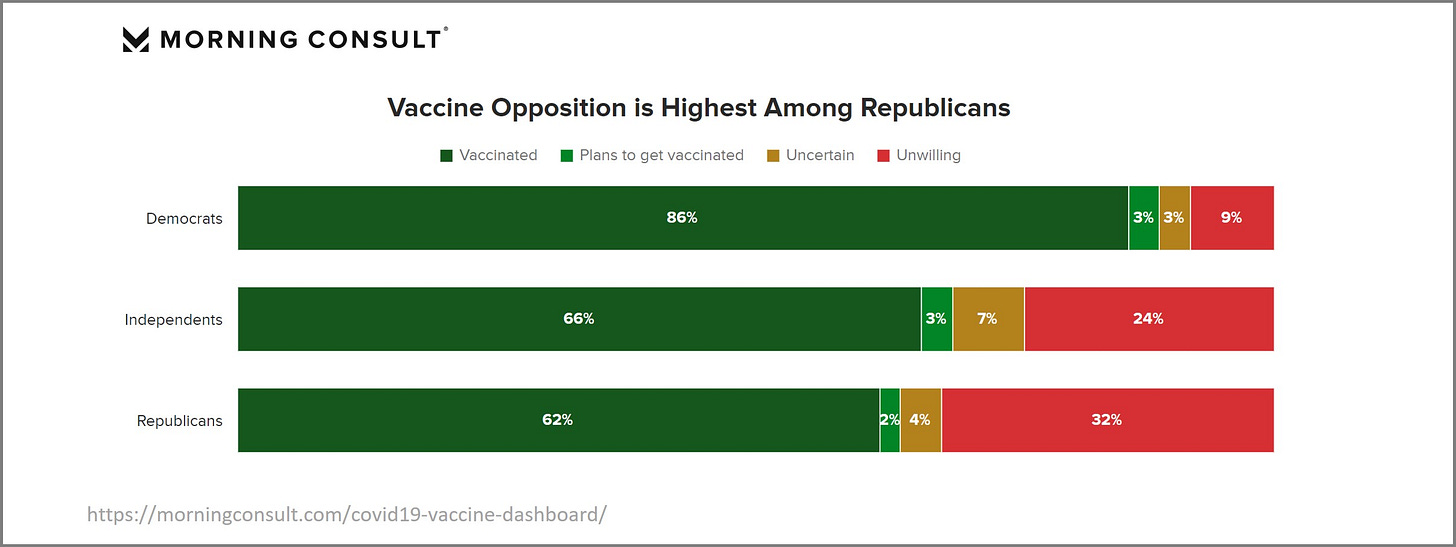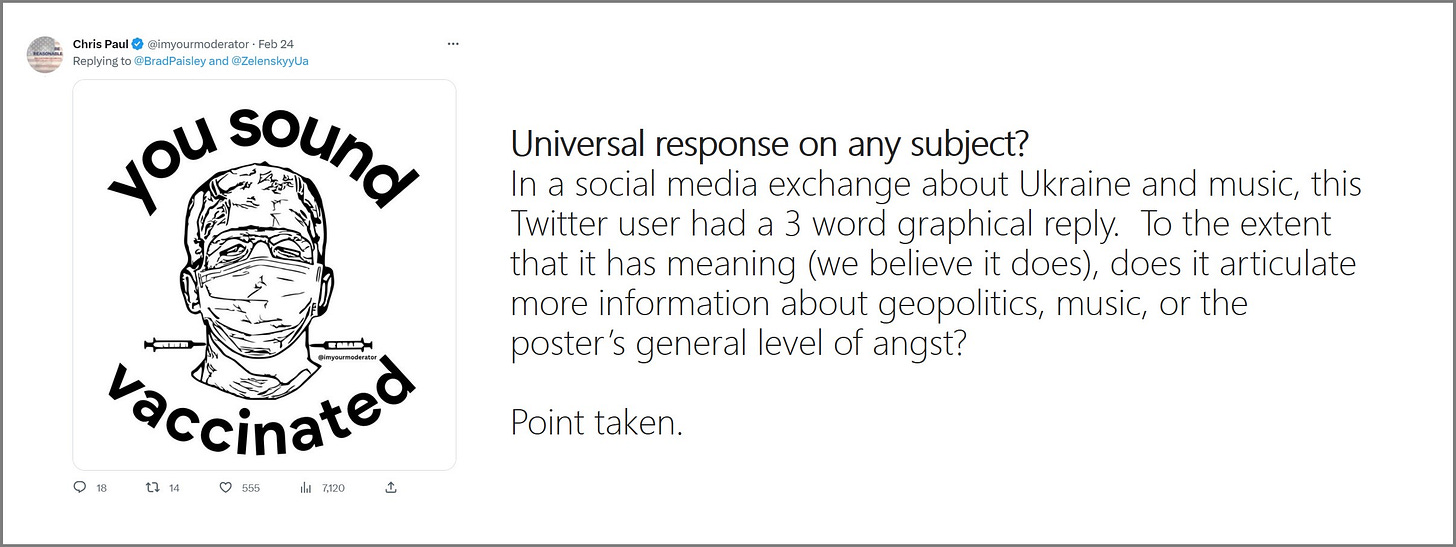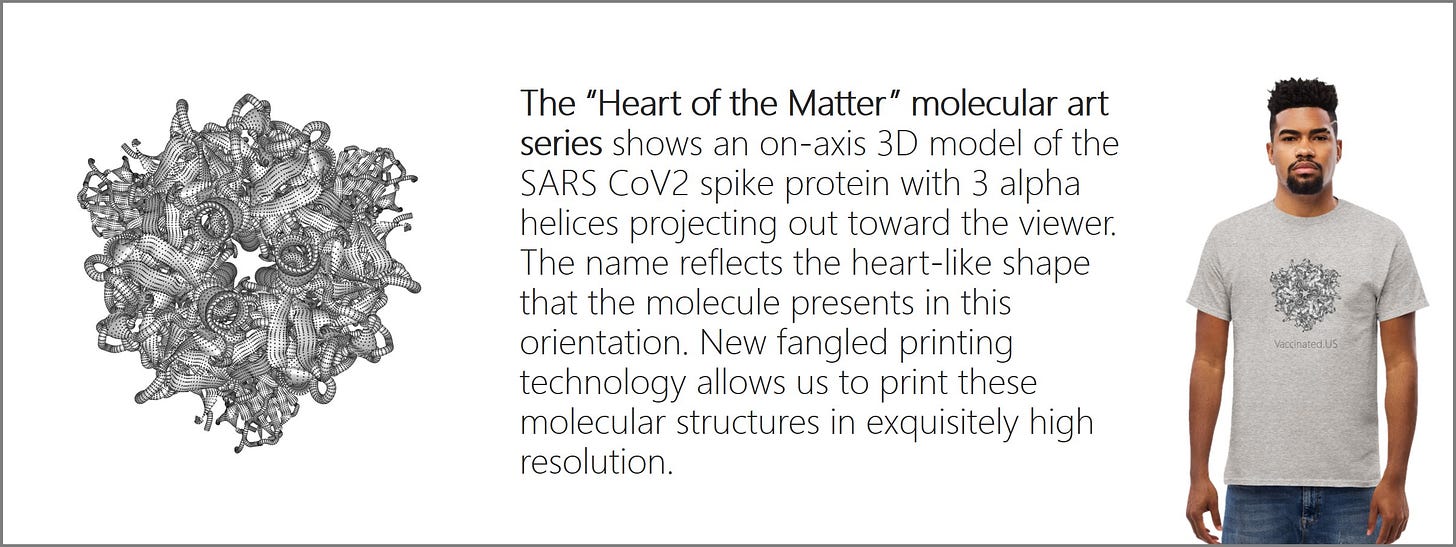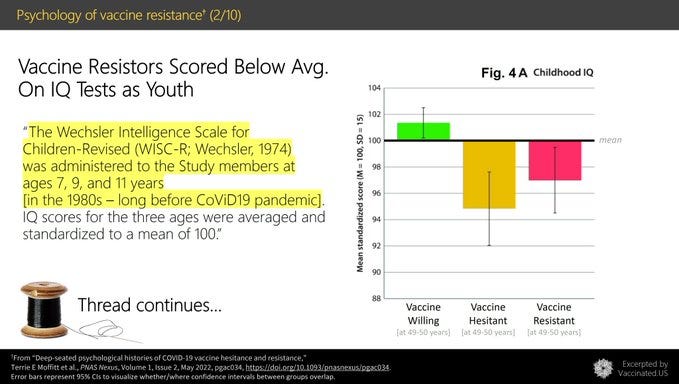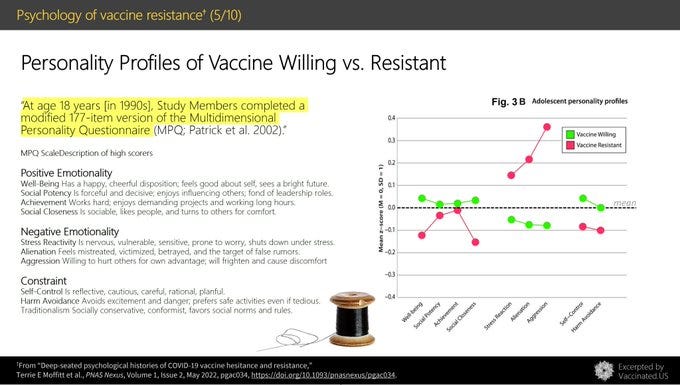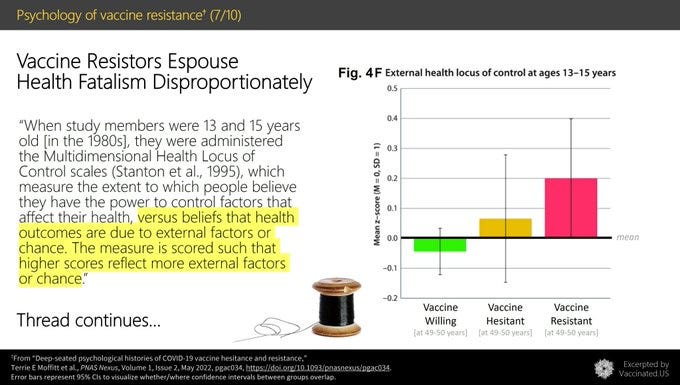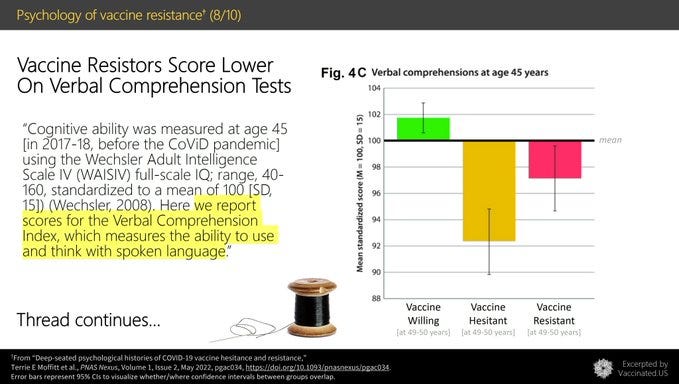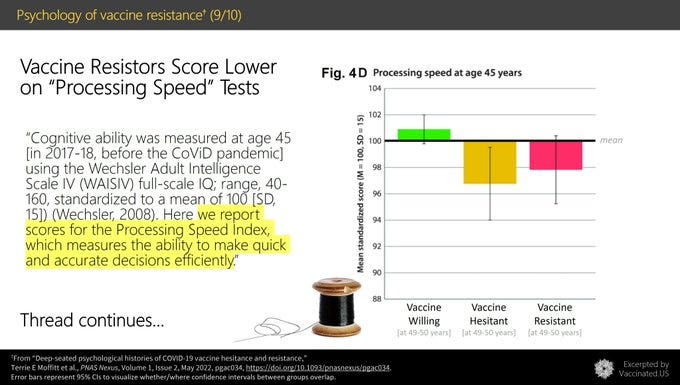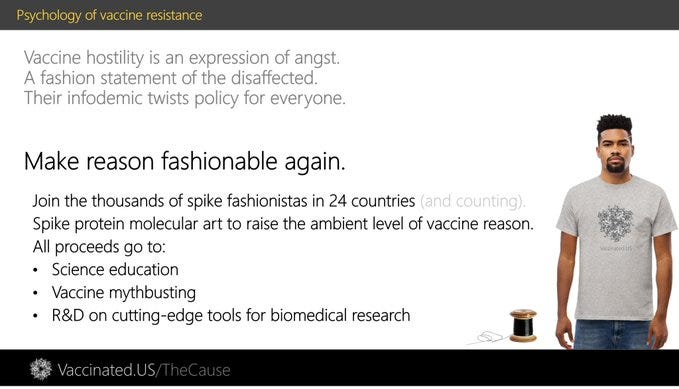Emerging psychology of vaccine resistance
A whirlwind tour of pandemic psych studies (with a spike fashionista chaser)
Matt Rain, PhD and Allison Neitzel, MD
The psychology of vaccine resistance turns out to be a fascinating window on humanity. On us. In order to figure out how to live together in health and democracy, we may need to check our collective reflection in the vaccine window every now and again on our way to the town square. This roundup of recent vaccine psychology studies might help us read the crowd when we get there.
First, at the time of this writing an astonishing 5.6 billion people on planet earth have received one or more doses of some CoViD19 vaccine, including ~270 million in the USA. Most people still embrace vaccines when good-faith testing demonstrates that they’re safe and effective against a plausible pathogenic threat — like the SARS-CoV2 virus that just killed ~6.9 million people around the world. And despite some ambient suspicion that our “institutions” don’t work, within the first couple years of the century’s most deadly pandemic, humanity pulled together to invent, test, manufacture, distribute, and administer more than 10 billion doses of CoViD19 vaccines.
That institutional glass may be half empty in some ways, but it’s also pretty full. Models estimate that CoViD vaccines prevented over 120 million infections, and prevented more than 20 million deaths in just their first year, so it’s not surprising that the rate of general public support for CoViD vaccines grew impressively in 2022 around the world. We all benefit from CoViD vaccines directly or indirectly, but we also see that vaccines are resisted and reviled by vocal subgroups with serious democratic implications. For example, in some countries politically conservative populations tend to have significantly “larger minorities” of vaccine resistors, as captured in this Morning Consult breakdown for the US.
The “unwilling” fraction of that Republican bar is a minority, but that minority is sizable compared to the other groups, and its impact ripples through society in measurable ways. For starters, Republican-leaning states and counties have tended to suffer higher death rates from all causes, and from CoViD19, during the pandemic (note red excess-death areas of Axios/NY Times figure below and example 1, example 2, and example 3).
After offering condolences to those conservative communities, we might acknowledge that psychological forces swirling in a vocal subgroup can roll up to impact health and policy outcomes for whole populations on a democratic scale. Some legislators are currently working to outlaw mRNA vaccine technology at the state level for any purpose, including promising cancer-fighting applications. And political pressure forced the US Department of Defense to retract rules requiring CoViD vaccines in the military — despite ongoing requirements that service members still receive 17 other vaccines in the name of military readiness. In this perfect-example scenario, the military claimed that vaccines are important to maintain our national defenses, but then they capitulated to political pressures of a vaccine-resistant minority — ostensibly at the cost of some national security. Working the refs really can impact the scoreboard.
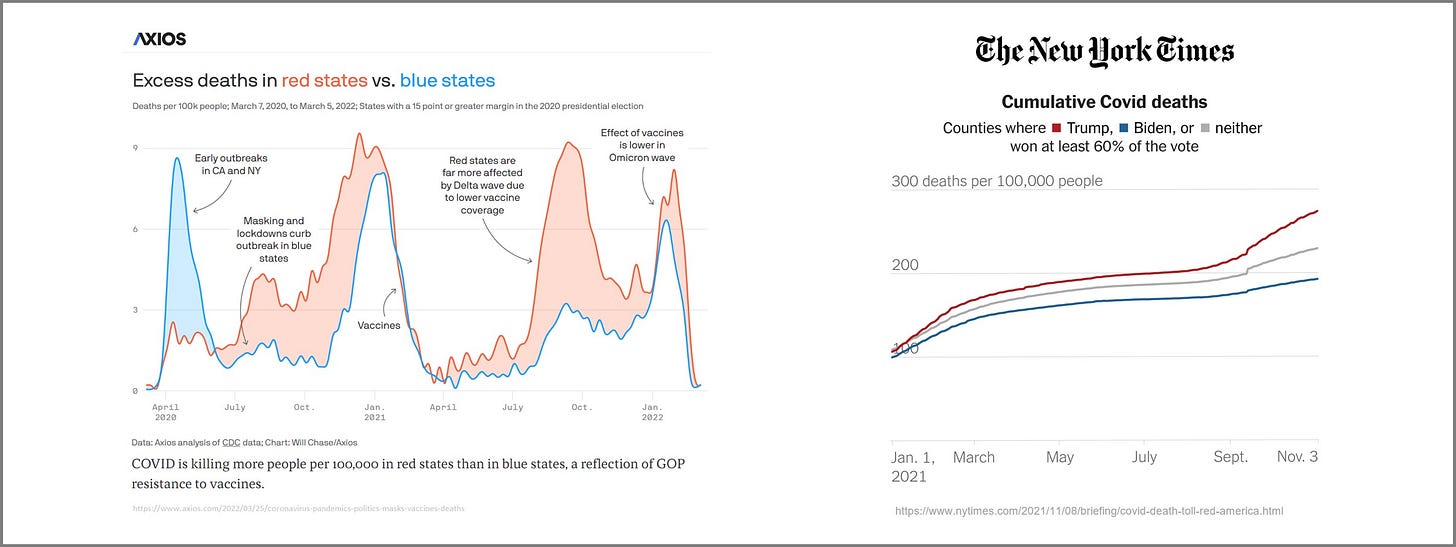
Four Noteworthy Strands in Recent Psychology of Vaccine Resistance
Emerging studies have started to uncover revealing layers of psychology that correlate with vaccine resistance. This synopsis is brief, so source links are included for those who like to dig deeper.
1. Vaccine resistance is a manifestation of underlying distrust of science and other institutions: Psychologists at Washington State University found that willingness to vaccinate against CoViD19 was substantially lower among people who don’t trust science. These authors postulate that this state of affairs might relate to Gallup’s observation that self-identified Republicans’ “trust” of science has declined 27 percentage points in their polls since 1975, even as Democrats’ trust for science rose slightly across those same 48 years of polling.
This trend, that vaccine hostility correlates with deeper institution-associated angst, has been reported repeatedly (example A, example B, example C). If large factions of society transition away from science as a basis for understanding the natural world (viruses, pandemics, medicine), what alternative sources of information will fill those voids?
2. Vaccine resistors are more likely to ingest information from sources that line up with their personal biases: After surveying 24,948 Americans, the author’s of another study from Harvard, Rutgers, and Northeastern found that, “compared to the average American, people who held vaccine-related or political misperceptions were more likely to get their news from friends and family, radio news, podcasts, and Fox News.” (see also example C). Some friends and radio stations might be great sources of accurate information — but if science avoiders are listening preferentially to other science avoiders, there is some risk that circulating information becomes progressively untethered from measurement, controlled experimentation, and statistics designed to parse oddball anecdotes from real patterns in complex public health phenomena (like viral pandemics).
3. Vaccine resistors were significantly more likely to have a background of learning disability, personality disorders, and/or adverse childhood events: In one extraordinary long-term study, researchers from New Zealand and Duke University tracked, tested, and analyzed virtually everyone born in Dunedin New Zealand between 1972-1973 (n > 1000 individuals). The researchers gave subjects cognitive, personality, and reading comprehension tests, they interviewed subjects’ close personal connections and then, when the worldwide CoViD19 pandemic arrived, they were able to observe which subjects’ personality characteristics tended toward vaccine resistance. In a nutshell, vaccine resistors were significantly more likely to have a background of learning disability, personality disorders, and/or adverse childhood events. The details of that study are remarkable, graphical results are distilled in a concise Twitter thread here, and they’re arranged as an appendix just below.
4. Conspiracy believers are measurably more likely to be wrong and confident about their beliefs at the same time: The Dunning-Kruger effect is a well-documented cognitive bias where people with limited understanding on a topic imagine themselves to be experts. This bias can act like a cognitive trap because affected people lack sufficient perspective to recognize the gaps in their own knowledge, so they may be slower to learn and self-correct. It’s fascinating to see real-world studies lay the Dunning-Kruger effect bare, and psychologists from U. Regina/Cornell University and MIT did that in a study whose title gives the whole game away – “Overconfidently conspiratorial: Conspiracy believers are dispositionally overconfident and massively overestimate how much others agree with them.”
Subjects in this study were given math tests, asked about their sympathies for a menu of conspiracy theories, then asked to estimate how well they performed on the math tests they had just submitted. The psychologists went to score the tests and found that participants who demonstrated the greatest support for incorrect conspiracy notions were more likely to a) underperform on the tests and then b) overestimate their test performance. On top of their “dispositional overconfidence,” they also “massively overestimate how much others agree with them.”
Scientists from Rutgers, Northeastern, and Harvard universities documented a similar pattern in a separate study of 18,872 people. In that one, the participants who claimed to have the most “expert knowledge about vaccines” were the most likely to demonstrate two or more demonstrable vaccine misperceptions on their study questionnaires.
So what?
How is psychology relevant to public health or policy navigation?
In the course of devising strategies to navigate our public health challenges, commenting on the psychology of vaccine resistant compatriots can have the distasteful appearance of seeming like an ad-hominem attack on people who simply hold different ideas. To be sure, ad hominem arguments are generally inappropriate (and unhelpful) for resolving rational disagreements. For emphasis, we’re insisting that ad hominem arguments are inappropriate and unhelpful for resolving rational disagreements — but here’s the rub... The intention of this review is not to endorse or refute any logical argument. And certainly not to do that on the basis of any psychological observations. The point is rather to zoom out and consider the possibility that much of our public vaccine debate proceeds as if it is a logical, objective undertaking when sometimes it just is not. Taken together, these psychology studies simply raise questions about the assumption that all vaccine debate is purely rational — and about what else we should be doing to wet the overwhelming scientific evidence that vaccines are safe and effective.
How might we explain psychological observations like the collection outlined above? Perhaps, despite the statistical significance of evidence, it’s pure coincidence that vaccine resistance correlates with distrust of institutions, low childhood IQ, poor reading comprehension, and pre-existing personality disorders. Heck, perhaps those characteristics give people better ability to interpret complex data from massive populations where highfalutin scientists want to drag in complex experimental controls and statistics to parse patterns. If intellectual honesty requires that we consider those explanations carefully, then perhaps intellectual honesty also requires us to consider the possibility that something else is going on. What if some vaccine resistance is a form of easy catharsis for frustrated people to vent their general angst in a way that feels good, gets attention, and seems to land satisfying punches against the institutions they dislike and don’t understand. What if vaccine hostility is more like a decision about counter-culture style or fashion then it is a conclusion about carefully considered facts? And what if those angsty vaccine resistance memes spread around society like contagious viral infodemics that erode our democratic public health capabilities? Does that “sound vaccinated”?
Look up!
In the 1960s Stanley Milgram, a Yale psychologist, ran a now-famous experiment where he sent his employees out to an urban street corner and instructed them to look up in unison, as if there was something important to see up above. He found that the more co-conspirators he recruited to look up for the scheme, the more passers by he could dupe to stop, crane, and look up with the herd… er, crowd. This became the foundation of a principle that was later dubbed “social proof,” which an anonymous author at Wikipedia described beautifully as a tendency “in ambiguous social situations where people are unable to determine the appropriate mode of behavior, and is driven by the assumption that the surrounding people possess more knowledge about the current situation.”
The vaccine disinformation industry preys on this human instinct to sow doubt and create the impression that ‘lots of people you know’ reject vaccine science. Many people look up at the dangled disinformation, and the pandemic-weary impressionable among us take the bait. With modern social networking tools, a small group of savvy disinformers reaches millions of people and makes millions of dollars peddling that tantalizing doubt. Then they use their proceeds to fund more disinformation in a vicious, profitable cycle (example X, example Y, example Z).
Are we powerless to push back?
In a world of complex scientific arguments that go over too many heads, where psychology reminds us that facts alone will not convince all cynics, and where a “dirty dozen” vaccine disinformers make millions peddling doubt, what can be done to defend and expand the beacheads of reason? Ⓐ Of course it’s critical to expand and refine scientific communication — to connect earnest people with the best-available information as it evolves. But many people are still on the fence about whether to trust science at all — plus scientific substance can be overwhelming and inscrutable. For the overwhelmed and confused, the psychology of social proof unwittingly kicks right in. When people don’t feel prepared or qualified to evaluate complex evidence on their own, they activate the shorthand assumption that whatever reasoning they encounter most often must be the best reasoning — and they attach. This seems to be a mechanism by which the gravity of loud vaccine disinformation draws people into its orbit. For them, Ⓑ it’s essential to establish a visible presence of empirically-oriented, personally represented, public health reason. As if simply to reassure, there are still people around you who respect science and reason. We’re out here.
The Vaccinated.US project is working to address detail Ⓑ so that more people will be open to Ⓐ.
Crazy idea
After studying the tactics of the disinformation “dirty dozen” we had a crazy idea: What if we twisted their cynical grift and virtue signaling upside down to do actual good? What if we created an artistic visual symbol of gratitude for legitimate vaccine science, hope for the power of reason, and solidarity around a commitment to rational democracy? What if we got molecular biologist artists to make that symbol out of 3D structures of the very spike protein molecule that makes every CoViD vaccine work so powerfully — and that saved those 20 million lives? And what if we released that art into the wild to create an ambient visible presence of that solidarity wherever people choose to opt into the sentiment? What if we flipped the anti-vax self-funding strategy for good, and plowed financial proceeds back into the dissemination of ACCURATE public health information, science, and research tools that seek to accelerate scientific progress itself?
That’s what we’re doing. Last September we released a collection of geeky 3D spike protein molecular art to the universe on t-shirts, hoodies, and other objects people care about (have you seen them?). In the first couple months we were thrilled to see thousands of supporters buy shirts from 24 countries and 48 US states — and many sent supportive words of encouragement. We hope legitimately uncertain people of goodwill, who imagine that they live in a world of overbearing vaccine hostility, will see those beacons of reason sprinkled around their worlds, and grok that it’s OK to look up with team rationality. We believe combining that awareness with gratitude is appropriate, overdue, and potentially helpful for disarming the hostility that infuses so much vaccine resistance.
In the first wave of the project we made a bunch of friends and raised a bunch of funds for “This Week in Virology” (an invaluable scientific communication outlet during the pandemic), and now we’re pivoting to support other groups and outlets of accurate information.
In an effort to hide these nefarious intentions out in the open, we’re publishing this explanation and inviting anyone who wants to join us in the vaccine gratitude slow moving flashmob. You can participate in any number of ways:
① Grab a piece of 3D molecular art and wear it around your neighborhood on any random Tuesday.
② Tweet a photo of you or a friend rocking your spike shirt, and tag it #SpikeFashionista (Instagram and TikTok work too).
We’re making a giant photo montage out of spike-shirt-wearing supporter selfies, and we’re going to turn that into a piece of art to be displayed in public places around the world (preferably high places to riff on the spirit of looking up with your neighbors in solidarity).
Times Square?
③ Tell a friend! Tell a bunch of friends. Send someone this article.
You can always check out the art and the store at Vaccinated.US.
When you buy “a piece” you are putting a nickel in the jar of funds we use to push back against the vaccine disinformation dozen. Follow us on Twitter to receive updates on partnerships, programs, the growing photo montage, and lessons that we learn together along the way. If it ever felt like reason was going out of style, we’re bringing it back. Consider joining us.

APPENDIX
Graphical summary of the paper “Deep-seated psychological histories of COVID-19 vaccine hesitance and resistance,”
by Terrie E Moffitt et al., PNAS Nexus, Volume 1, Issue 2, May 2022, pgac034, https://doi.org/10.1093/pnasnexus/pgac034
Our tweet on this study started thus…
An #AntiVaxxer #WalksIntoABar with an ER doc and a psychologist and yells "vaccines suck!" The doc presents 874 peer reviewed studies suggesting otherwise. The psychologist discovers antivaxxers have deep seated personality issues that link back to childhood. Check this study…
Study participants were tracked since birth (in 1970s): Today’s vaccine resistors scored lower on IQ tests as youth, in the 1980s. Statistically significant. What does this mean? Study 🧵continues…
CoViD vaccine resistors scored lower on "reading ability" tests in the 1990s, when they were 18 years old. Statistically significant. What does this mean? Study 🧵 continues…
Today’s vaccine resistors showed signs of emotional challenge in the 1990s, when they were 18. Statistically significant across many traits. What does this mean? Study 🧵continues…
Long before the CoViD pandemic, friends and family members of today’s vaccine resistors reported those future resistors were more neurotic, less conscientious, and less “agreeable” people. What does this mean? Study 🧵continues…
The teenagers who believed that health factors were out of their control in the 1980s grew up to be vaccine resistors in the 2020s when the pandemic "happened to them." What does it mean? Study 🧵 continues…
The people who scored lower on comprehension tests in ~2017, before the pandemic, became vaccine resistors when the global pandemic later occurred in 2020+. What does it mean? Study 🧵 continues…
The people who scored lower on tests of “processing speed” in ~2017, before the pandemic, became the vaccine resistors when a global pandemic later emerged with complex science/health messages. What’s up with this? Study 🧵 continues…
This extraordinary study started tracking psychological traits of ~everyone born in Dunedin in ~1972. When anti-vaxxers emerged 50 years later researchers could look back & track which psych traits 🡆 vaccine resistance. Full study at https://doi.org/10.1093/pnasnexus/pgac034… Punchline?
🧵…
We assume vax disagreement turns completely on facts & reason. But what if resistance is more like a fashion than a conclusion? What if vax hostility is the only "style" around for some kids in some circles? We're bringing "sensible" back.
Credits:
Foregoing tweet thread is on Twitter at


Matt Rain is a molecular geneticist who works on novel data analysis technologies to unstick persistent bottlenecks in biomedical research.
Allison Neitzel is a physician researcher with interest in dis/misinformation dark money, public and global health, social determinants of health, and health equity.
Studies and graphs are linked to their respective sources, or secondary articles that add value and link the primary.
Looking up photo is from Wikimedia Commons here.
Morning Consult poll graph is adapted from: https://morningconsult.com/covid19-vaccine-dashboard/
Axios red/blue excess deaths graph for states is adapted from https://www.axios.com/2022/03/25/coronavirus-pandemics-politics-masks-vaccines-deaths
New York Times graph summarizing county-level cumulative deaths is adapted from https://www.nytimes.com/2021/11/08/briefing/covid-death-toll-red-america.html
Follow the Vaccinated.US project on Twitter.





